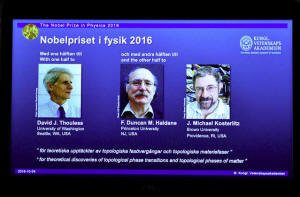|
Science of 'exotic' states of matter
lands Nobel physics prize
 Send a link to a friend
Send a link to a friend
 [October 04, 2016]
By Niklas Pollard [October 04, 2016]
By Niklas Pollard
STOCKHOLM (Reuters) - British-born
scientists David Thouless, Duncan Haldane and Michael Kosterlitz won the
2016 Nobel Prize for Physics on Tuesday for their studies of unusual
states of matter, which may open up new applications in electronics.
Their discoveries, using advanced mathematics, had boosted research in
condensed matter physics and raised hopes for uses in new generations of
electronics and superconductors or future quantum computers, the Royal
Swedish Academy of Sciences said.
"Thanks to their pioneering work, the hunt is now on for new and exotic
phases of matter," the academy said in a statement awarding the 8
million Swedish crown ($937,000) prize.
"Many people are hopeful of future applications in both materials
science and electronics."
Thouless was awarded half the prize with the other half divided between
Haldane and Kosterlitz. Nils Martensson, acting chairman of the Nobel
Committee for Physics, told a news conference the winners had discovered
a set of totally unexpected regularities in the behaviour of matter.

"This has paved the way for designing new materials with novel
properties and there is great hope that this will be important for many
future technologies," he said.
Physics is the second of this year's crop of Nobels and comes after
Japan's Yoshinori Ohsumi was awarded the prize for medicine on Monday.
As Nobel physics laureates, the trio of researchers join the ranks of
some of the greatest names in science, including Albert Einstein, Niels
Bohr and Marie Curie.
[to top of second column] |

A screen showing pictures of the winners of the 2016 Nobel Prize for
Physics during a news conference by the Royal Swedish Academy of
Sciences in Stockholm, Sweden October 4, 2016. From left: David
Thouless, Duncan Haldane and Michael Kosterlitz. TT News
Agency/Anders Wiklund/via REUTERS

The prizes were first awarded in 1901 to honour achievements in
science, literature and peace in accordance with the will of the
Swedish dynamite inventor and business tycoon Alfred Nobel, who left
much of his wealth to establish the award.
For a graphic on Nobel laureates, click on: http://tmsnrt.rs/1jLPeM7
(Reporting by Anna Ringstrom, Bjorn Rundstrom, Simon Johnson and
Johan Ahlander; Writing by Niklas Pollard; Editing by Mark
Trevelyan)
[© 2016 Thomson Reuters. All rights
reserved.]
Copyright 2016 Reuters. All rights reserved. This material may not be published,
broadcast, rewritten or redistributed.
 |